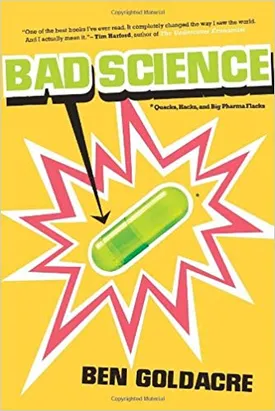Bad Science: Quacks, Hacks, and Big Pharma Flacks by Ben Goldacre
Many of us marvel at science, with its promise of curing diseases, finding cures for the scourge of society, and developments in technology that allow us to navigate the ever-changing global landscapes. But what happens when science is misused and taken out of context, leading to public misconception and mistrust of the processes that once were held in high esteem? This is the topic at the heart of Bad Science: Quacks, Hacks, and Big Pharma Flacks, an eye-opening book written by British doctor, author and long-time campaigner against bad science Ben Goldacre. Throughout his book, Goldacre takes a hard look at the misuse and misunderstanding of science within the media, political discourse, and the corporate world in an effort to ensure that accuracy and public health remain the priorities in modern society.
Goldacre begins his narrative by questioning the implications of “The Health Belief Model”, a concept used by many governments and corporations to encourage people to maintain good health behaviors, by preying on their fears. For example, they may exploit the fears of a potential disease outbreak to create a more comprehensive vaccination campaign. Goldacre contends that these attempts at behavioral modification can have overarching implications, such as creating a society in which individuality and independence are suppressed, and that this is not the best way to promote public health.
The book then moves on to critique the medical industry, which has become increasingly distorted by the powerful and influential pull of Big Pharma. Goldacre takes us through the inner workings of pharmaceutical firms, including how they acquire data, the results of their studies, and the push to create new medications or treatments in pursuit of ever-higher profits. This phenomena is especially present in the way medicines are accounted for and the tactics the pharmaceutical industry uses to influence public opinion, resulting in issues such as over-prescription and over-priced medications leading to public mistrust in the healthcare industry.
Goldacre then moves to delve into the concept of ‘Evidence-based Medicine’ which encompasses the use of existing research, as well as meta-analytics, to decide which therapies and treatments should be administered. This effort at providing objective medical advice is meant to alleviate issues such as “evidence free” healthcare and erroneous medical advice featured in magazines and other such outlets.
The book finally concludes on a hopeful note, as Goldacre argues that that the process of science is still redeemable and that with more effective communication between researchers and the public, there is still potential to correct the past mistakes in the medical industry. He closes by encouraging the reader to “Get angry. Read. Ask questions. Find out the truth.”
Bad Science: Quacks, Hacks, and Big Pharma Flacks is an essential read for all those interested in understanding and improving the accuracy and efficacy of our healthcare system. For well-researched and thought-provoking writing from a man with first-hand experience with the faults of the healthcare industry, look no further than Goldacre’s iconic Bad Science.

